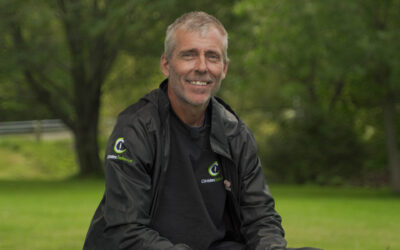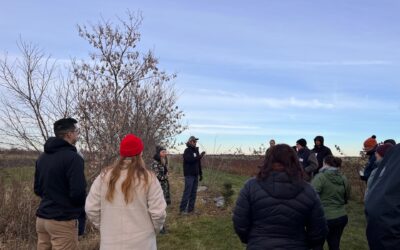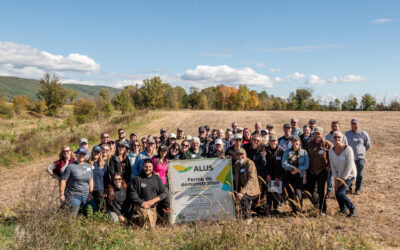
Alberta philanthropist David Bissett and ALUS Canada, a Weston Family Initiative, announce the “Bissett Action Fund,” a $500,000 gift which will support nearly 1,000 acres of ALUS projects.
On August 29, 2017, Alberta philanthropist David Bissett and ALUS Canada, A Weston Family Initiative, announced “The Bissett Action Fund,” a new $500,000 gift which will support environmental projects on farms and ranches in southern Alberta.
Speaking at the Indigenous Plant Species Biome garden at the Southern Alberta Institute of Technology (SAIT) today, Mr. Bissett gave a ringing endorsement of ALUS as the new generation of Canadian conservation.
“It’s all very well to promote conservation,” he said, “but we can’t regulate farmers into providing ecosystem services; we have to work with them, and provide the resources to encourage them to produce these valuable services. That’s why ALUS is a great way to go.”
The $500,000 Bissett Action Fund will be used to help 39 farmers and ranchers maintain 186 ALUS projects south of Edmonton, between the County of Vermilion River to the east and Lac Ste. Anne County and Parkland County to the west. These projects include wetland restorations, buffer zones around croplands, riparian zones with pollinator habitat, and wildlife-friendly fences that keep cattle out of streams to protect water quality.
“David Bissett is a long-time supporter of the program, and we are thrilled he has renewed his support for ALUS,” said Bryan Gilvesy, CEO of ALUS Canada. “By funding ALUS’ work on privately owned parcels of agricultural land, the Bissett Action Fund will increase ecosystem services beneficial to all Albertans. Specifically, this funding means that 958 acres of marginal, ecologically sensitive farmland in Alberta will now be deployed by the landowners to produce cleaner air, cleaner water, increased wildlife habitat and other ecosystem services.”
The Bissett Action Fund is already being put to good use on the Movald Farm in Brazeau County. ALUS participants Duane Movald and his parents run a fifth-generation family farm, growing forages and cereals and raising purebred Simmental cattle on 1,900 acres west of Breton, Alberta. “We’ve enrolled 23 acres in ALUS so far, mainly for riparian projects,” says Movald, “and we can already see a difference, with more birds and pollinators, less erosion, cleaner water and just a healthier environment all around. I am very proud to be part of ALUS.”
Following the announcement, ALUS unveiled new signage for Alberta wild rose and sweetgrass plants it has donated to SAIT’s indigenous species garden. For ALUS, this urban meadow is an important demonstration to SAIT’s students, as future technical experts of Alberta’s agriculture sector, that even small pieces of marginal land can be useful for producing valuable ecosystem services.
A lesson not lost on the 50-odd guests at today’s press conference, where Bissett and Gilvesy were joined by SAIT’s Vice President of External Relations, Heather Magotiaux, prominent leaders from Calgary’s philanthropic and business communities, ranchers and farmers participating in ALUS, and mayors and reeves of Alberta communities running ALUS programs.
There are currently ten ALUS communities in Alberta, including the Counties of Parkland, Red Deer, Mountain View, Brazeau, Lac Ste. Anne, Wetaskiwin/Leduc, Northern Sunrise, Flagstaff and Vermilion River—whose Reeve, Daryl Watt, passionately described the benefits of ALUS for local communities, speaking as the first municipal leader to bring ALUS to Alberta back in 2010.
“Municipalities continue to express interest in starting up new ALUS programs,” noted Gilvesy. “A year and a half ago, we had 3,600 acres enrolled in the ALUS program here; today, we have more than double that. And over the next five years, we anticipate doubling our capacity to deliver ecosystem services in this province.”
The ALUS program is also expanding rapidly in other Canadian provinces. In total, ALUS has already created more than 18,000 acres, an area the size of 45,000 hockey rinks, dispersed among 20 ALUS communities in Saskatchewan, Manitoba, Ontario, Quebec and PEI.
By 2025, ALUS aims to reach 150,000 acres in 75 communities across the nation. To get there, the charity will rely on philanthropic donations like the Bissett Action Fund, grants from many sources, and a corporate sponsorship program called New Acre™ Project.
“It’s the first of its kind in North America,” said Gilvesy. “With New Acre™ Project, corporations can invest in the environmental issues that matter most to them, knowing their investment will produce lasting benefits for the communities they serve.”



